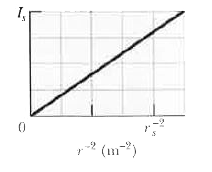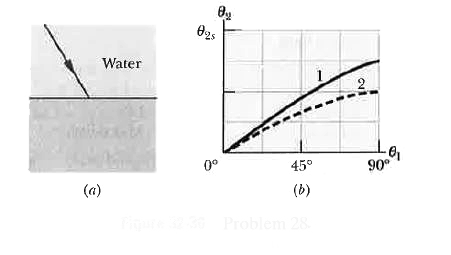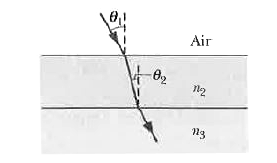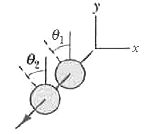PROBLEMS from RESNICK AND HALLIDAY PHYSICS (HINGLISH) ELECTROMAGNETIC WAVES for Class 12
| Class 12 | PHYSICS |
| Chapter | ELECTROMAGNETIC WAVES |
| RESNICK AND HALLIDAY PHYSICS (HINGLISH) | PROBLEMS |
| Medium | English |
| Academic Year | 2023-2024 |
Question 1
A beam of polarized light is sent into a system of two polarizing sheets . Relative to the polarization diretion of that incident light the polarizing direction of the sheets are at angles θ for the first sheet and 90∘ for the second sheet . (a ) If 0.20 of the incident intensity is transmitted by the two sheets what is θ (b ) What percentage of the incident intensity is transmitted if the first sheet angle is reduced to 0∘ ? View SolutionQuestion 3
In Fig 32-24 a beam of light with intensity 43 W/m2 and polarization parallel to a y axis is sent into a system of two polarizing sheets with polarizing directions at angles of θ1=70∘ and θ2=90∘ to the y axis . (a) What is the intensity of the light transmitted by the two sheet system ? (b) What is the transmitted intensity if instead the initial polarization is parallel top the x axis ? View SolutionQuestion 4
We want to rotate the direction of polarization of a beam of polarized through 90∘ by sending the beam through one or more polarizing sheets . (a) What is the minimum number of sheets required ? (b) What is the minimum number of sheets required if the transmitted intensity is to be more than 65% of the original intensity ? View SolutionQuestion 5
In Fig 32-25 unpolarized light is sent into a system of three polarizing sheets. Which transmits 0.0500 of the initial light intensity . The polarizing directions of the first and third sheets are at angles θ1=0∘ and θ3=90∘ . What are the (a) smaller and (b ) larger possible values of angle θ2(<90∘) for the polaring direction of sheets 2? View SolutionQuestion 6
At a beach the light is generally partially polarized due to reflections off sand and water. At a particular beach on a particular day near sundown the horizontal component of the electric field vector is 2.3 times the vertical component . A standing sunbather puts on polarizing sunglasses , the glasses eliminate the horizontal field component . (a) What fraction of the light intensity received before the glasses were put on now reaches the sunbather 's eyes ? (b) The sunbather still wearing the glasses lies on his side . What fraction of the light intensity received before the glasses were put on now reaches his eyes ? View SolutionQuestion 11
A plane electromagnetic wave with wavelength 5.0 m, travels in vacuum in the positive direction of an x axis . The electric field of amplitude 215 V/m oscillates parallel to the y axis. What are the (a) frequency (b) angular frequency and ( c) angular wave number of the wave ? (d) What is the amplitude of the magnetic field component ? (e) Parallel to which axis does the magnetic field oscilate ? (f) What is the time -averaged rate of energy flow in watts per square meter associated with this wave ? The wave uniformly illuminates a surface of area 2.0 m2 . If the surface totally absorbs the wave what are (g) the rate at which momentum is transferred to the surface and (h) the radiation pressure on the surface ? View SolutionQuestion 16
Assume (unrealistically ) that a TV station acts as a point source broadcasting isotropically at 1.0 MW. What is the intensity of the transmitted signal reaching proxima Centauri the star nearest our solar system 4.3 ly away ? A light -year (ly) is the distance light travels in one year . View SolutionQuestion 20
The intensity I of light from an isotropic point source is determined as a function of distance r from the source . Figure 32-29 gives intensity I versus the inverse square r(−2) of that distance . The vertical axis scale is set by Is=200W/m2 and the horizontal axis scale is set byr−2s=8.0m2 . What is the power of the source ?
 View Solution
View SolutionQuestion 21
An airplane flying at a distance of 10 km from a radio transmitter receives a signal of intensity 28 μW/m2 . What is the amplitude of the (a) electric and (b) magnetic component of the signal at the airplane ? ( c) If the transmitter radiates uniformly over a hemisphere what is the transmission power ? View SolutionQuestion 22
In Fig.32-30 a light ray in water is incident at angle θ1 on a boundary with an underlying material into which some of the light refracts . There are two choices of underlying material. For each the angle of refreaction θ2 versus the incident angle θ1 is given in Fig. 32-30b . The vertical axis scale is set by θ2s=90∘ . Without calculation determine whether the index of refraction of (a) material 1 and (b) material 2 is greater or less than the index of water (n=1.33) . What is the index of refraction of (c) material 1 and (d) material 2?
 View Solution
View SolutionQuestion 24
In Fig 32-31 a light ray in air is incident on a flat layer of material 2 that has an index of refraction n2=1.5 . Beneath material 2 is material 3 with an index of refraction n3 . The ray is incident on the air -material 2 interface at the Brewster angle for that interface . The ray of light refracted into material 3 happens to be incident on the material 2 -material 3 interface at the Brewster angle for that interface . What is the value of n3 ?
 View Solution
View SolutionQuestion 25
A plane electromagnetic wave traveling in the positive direction of an x axis in vacuum has components Ex=Ey=0 and Ez=(4.0V/m)cos[(π×1015s−1)(t−x/c)] . (a) What is the amplitude of the magnetic field component ? (b) Parallel to Which axis does the magnetic field oscillate ? (c ) When the electric field component field oscillate ? (c ) When teh electric field component is in the the positive direction of the z axis at a certain point P what is the direction of the magnetic field component there ? (d) In what direction is the wave moving ? View Solution

